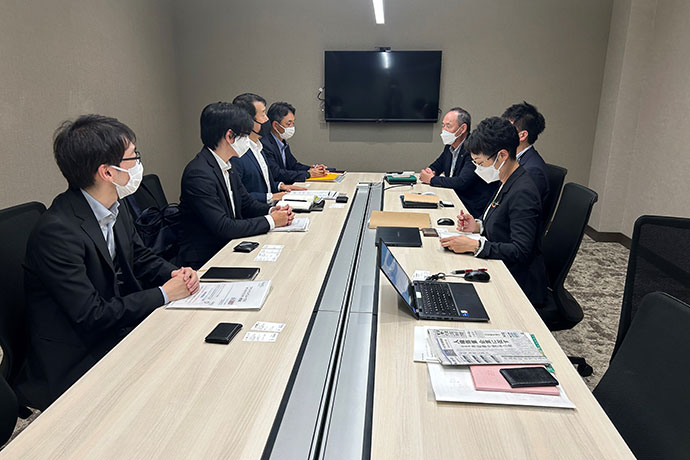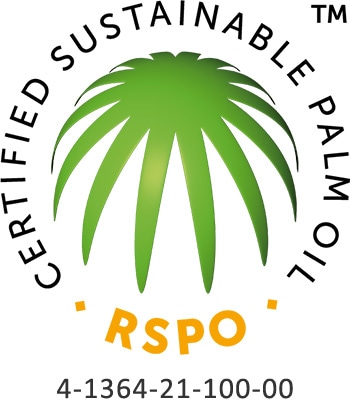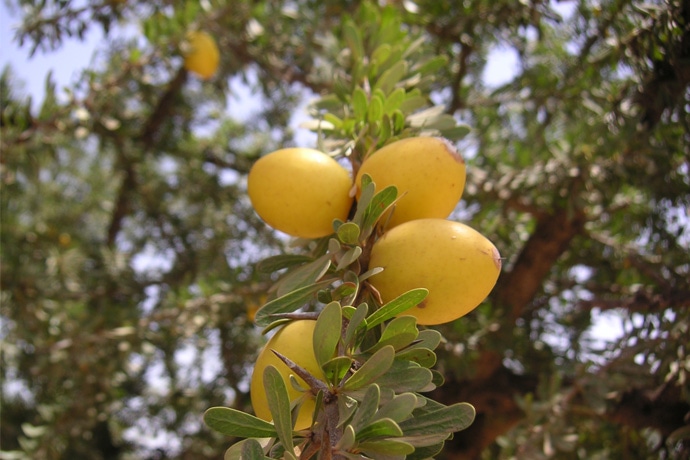We aim to build relationships of mutual prosperity and coexistence with our business partners and realize sustainable procurement that takes the environment, human rights, and labor issues into consideration.
- We conduct sustainable procurement with our business partners in accordance with the FANCL Group Sustainable Procurement Policy.
- We work with members of the RSPO※1 and JaSPON※2 to promote the procurement and use of sustainable palm oil.
- 1 Roundtable on Sustainable Palm Oil (joined 2018)
- 2 Japan Sustainable Palm Oil Network (joined 2019)
Targets
-
Procurement of sustainable palm oil
By FY Mar/2024100%(FY Mar/2023 : 100% Achieving our goals)
RSPO Mass Balance 54%, Book & Claim 46%
Note: Actual results from Jan. to Dec. 2022
Procurement of sustainable palm oil applies to cosmetics and health foods made by FANCL and ATTENIR
FANCL Group Sustainable Procurement Policy
Based on our founding philosophy of eliminating ‘negatives’ with a sense of justice, FANCL Group works with its business partners to provide reliable, safe, and high quality products and services to customers.
Initiative report
Anti-corruption initiatives
The FANCL Group Sustainable Procurement Policy sets forth basic rules for relationships with suppliers, and the Trading Partner (Supplier) Guidelines include an anti-corruption clause to ensure that all suppliers are fully aware of these rules. New transactions are initiated under contracts concluded in accordance with the FANCL Group Sustainable Procurement Policy and Trading Partner (Supplier) Guidelines.
Cooperation with trading partners
The FANCL Group is working with our trading partners to achieve sustainable procurement aimed at resolving social issues in the supply chain. We taking initiatives step by step.
- January 2020
- We conducted a questionnaire with about 100 suppliers regarding the status of their sustainable procurement initiatives.
- January 2021
- We revised the FANCL Sustainable Procurement Policy.
We formulated the Trading Partner (Supplier) Guidelines and sent these to approximately 2,200 suppliers. - October 2022
- We conducted a survey of 458 suppliers on their compliance with our Trading Partner (Supplier) Guidelines.
- April to June 2023
- We interviewed some suppliers based on the results of this survey.
- June 2023
- Sedex※Membership
In the survey of compliance with our Trading Partner (Supplier) Guidelines, we have expanded the scope to secondary suppliers, including those overseas, and have used English-language questionnaires to assess their compliance. Based on the results of the questionnaire, we conducted interviews with 23 companies involved in major transactions to achieve responsible and sustainable procurement that takes human rights and the natural environment into consideration. Going forward, we will use Sedex to identify, analyze, and assess human rights and environmental risks within the FANCL Group and engage in activities for improvement through dialogue with our suppliers.
Sedex is a reporting platform for sharing and verifying information on labor standards, health and safety, the environment, and business ethics, to promote responsible business practices in the supply chain.

Procurement of sustainable palm oil
Palm oil is a vegetable oil obtained from oil palms grown in tropical regions. In Malaysia and Indonesia (the main producers of palm oil), there are serious issues related to large-scale deforestation of tropical forests due to agricultural development, and the human rights of agricultural workers. Since palm oil is also used in FANCL's main products such as Mild Cleansing Oil, we have set a goal of procuring sustainable palm oil. We joined the Roundtable on Sustainable Palm Oil (RSPO)※1 and the Japan Sustainable Palm Oil Network (JaSPON)※2.

In 2021, 100% of the palm-derived raw materials we used in cosmetics and health foods were compliant with the RSPO book-and-claim method. Furthermore, under our policy of increasing the proportion of palm oil certified through the mass balance method (physically certified oil), in September 2021 we acquired RSPO supply chain certification for our factories (Chiba, Gunma, and Shiga plants). In 2022, we achieved 100% sustainable palm oil procurement, with 54% of the oil certified by the mass balance method and 46% by the book-and-claim method. Going forward, we will gradually switch to palm oil certified by the mass balance method.
- Roundtable on Sustainable Palm Oil
- Japan Sustainable Palm Oil Network
ATTENIR Skin Clear Cleanse Oil
ATTENIR Skin Clear Cleanse Oil is a product containing argan oil that treats pores, blackheads, and sebum. It uses high-quality argan oil from the Targanine network of co-operatives which was established with the aim of alleviating poverty in desert regions and improving the social status and independence of women in such regions. Using this oil promotes the protection of argan trees and employment for local women, as well as contributing to improving the status of women.


Sustainable Vegetable Squalene
All skincare products sold by the FANCL Group use vegetable squalene from olives and sugar cane. Squalene, which is used as a raw material for cosmetics, is generally derived from gulper sharks. However, the capture of large numbers of already endangered sharks risks driving them to extinction and destroying the ecological balance of marine life.
